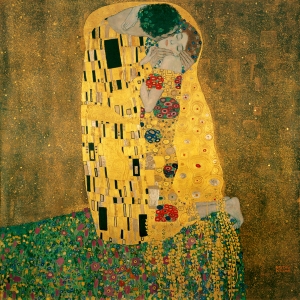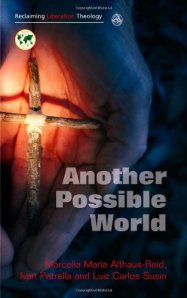I’ve been going back over some of the work I began last summer on a paper attempting to think sexuality and marriage theologically. This is to be a reworking of my undergraduate thesis, which will probably bear little resemblance to that paper in any way except a reuse of one or two sources and a concern with thinking “good news” for queer folk that actually is good news (as per my previous post). I really think that the way Paul locates marriage among those natural orders that Christians are free w/r/t is crucial to thinking sexuality as something that is “queered” as it mingles with the body of Christ by baptism/crucifixion/resurrection. The struggle for me, then, is how to think that alongside the sacramental status of marriage in the post-Pauline church (which, in practice, is hard not to read as a straight endorsement of marriage as such).
As I was thinking through the deadlocks I reached before the semester started, I started wondering about the sacramental status of marriage alongside Zizek’s notion of overconformity; the way to break up an ideological order, for Zizek, is not to simply resist explicitly (resistance is what the order counts on) but to identify fully with one of the operative rules of law at work in that order, refusing the implicit exceptions by which the law functions. For Zizek, this act of taking the law more seriously than it is built to be taken subverts the law’s own ideological function and breaks it apart as a functionary of the given order. While Zizek works out this notion of overconformity from a reading of Paul’s reflections on the law in Romans, he distances himself from the notion that this is a straightforward reading of what Paul is doing; it seems to him to be an operative logic that Paul gropes at but never quite identifies explicitly.
I’m starting to wonder, though, if something like this excessive character really is at work in the way Paul addresses issues other than the law (gender and marriage, for instance). Furthermore, I’m wondering if this logic of excess is endemic to the notion of sacrament itself.
One helpful thing for me about this way of thinking, at least while I’m “trying it on,” is that it fits rather nicely with Paul’s proclamations of freedom AND his non-libertinism. It also deals well with the manifestly “excessive” character of pre/Augustinian treatments of marriage/celibacy. Thus, the other side of the coin (of getting so damn married that polite, married society can only say “whoah, slow down, buddy”) is getting so damn not-married that tempered, discerning, independent folks can only say “whoah, slow down, buddy.” The trick, from there, is that it’s easy to inscribe even that into a sort of “right” and “churchy” way of doing sexuality. I think it’s pretty obvious that that’s the world we now live in. Even if there’s something to this schema of sacramental excess, it’s difficult to know what to do with it in a world where even excessive marriage and celibacy have been successfully assimilated into the power complex of marriage itself.
Maybe, remembering how marriage is to be sacramental doesn’t help one “know what to do,” so much as it reminds us that the position we’re in is always that of eunuchs who are to receive other eunuchs as means’ of grace? Which is not to say that the sacrament is not to be practiced, but that it is to be practiced only sacramentally; that is, only as a way of learning to be opened/given for the life of the world. A good friend and prominent influence of mine recently asked the (rhetorical) question “what if all sacraments were nothing more than the irruption of the crucifixion/resurrection of Jesus into the institutions of normal well-adjusted life?” I think this gets close to where I want to be going, but the problem I can’t shake is that the sacraments manifestly aren’t that. It seems exceedingly easy for this sort of sacramental talk to get re-inscribed in a mindset where the most revolutionary thing one can do is prop up actually existing church practices. It may be my pessimism, or it may be my heavy Quaker influences, but it seems to me that even and especially our rituals and patterns of being churchy have to die before they can be something else.


